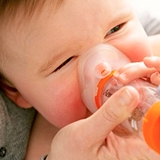- breathing more rapidly than normal
- refusing to eat
- looking very pale and their lips appear blue
- moving their ribs or stomach in and out quickly
- listless and does not respond to you
My baby has asthma. What should I do?

babyadmin |
Asthma is a chronic disease where during an attack or an episode, causes the airways to become narrowed and blocked with excess mucus. While the effects are temporary, it causes difficulty breathing.
The number of children diagnosed with asthma is on the rise, particularly in developed countries. About 20% of children in Singapore have been diagnosed with asthma. Even so, asthma is very difficult to diagnose in babies.
Signs of asthma
During an asthma attack, the child may begin to have bouts of coughing, wheezing and difficulty breathing. The breathing rate increases and they may have trouble sucking and feeding. Their cries may also sound softer.
In very young babies, doctors may hesitate to diagnose them with asthma because their symptoms may be a result of another problem such as a viral infection. Their airways are small and any swelling or constriction of the airways may result in wheezing and them presenting symptoms similar to that for asthma. Your doctor, however, may still prescribe the child asthma medication because not treating asthma can lead to permanent damage to the lungs. Seek medical help if you are unsure, and especially if you notice that your child is:
